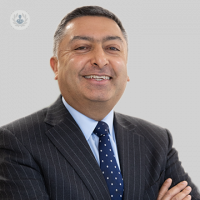The nSTRIDE protein injection: are there any side effects?
Escrito por:The nSTRIDE autologous blood protein injection is a good option for the treatment of osteoarthritis in the knee and now in other joints as well. It is a simple procedure, which involves taking blood from the patient, purifying proteins from that blood and injecting a small amount of protein-rich fluid back into the knee in a minimally invasive manner.

There is no anaesthetic involved and it is essentially what we call a walk-in walk-out procedure. When comparing this type of injection to other injections such as steroids or lubricants, the injection involves the use of the patient's own blood proteins and therefore no drugs are injected. Secondly, it is a natural biological treatment and thirdly, the mechanism in which it acts is such that it is aimed at trying to reduce or slow the progress of osteoarthritis, whereas the other injections just try to improve the symptoms.
Who can benefit from the procedure?
The treatment is used for osteoarthritis. Initially, the procedure has been brought to the UK for osteoarthritis of the knee but through the company that promotes this product, I have permission to treat patients with osteoarthritis in other joints. Therefore, I have treated patients with osteoarthritis in the hip and in the ankle as well, but predominantly the treatment has been available for osteoarthritis in the knee.
It is indicated for patients with moderate arthritis, not severe arthritis. It is not a substitute for total knee replacement. It's ideal in patients who we call the ‘gap generation’ where keyhole surgery is not going to really give them a great deal of benefit. We know that keyhole surgery for osteoarthritis doesn't yield very good results and in patients with moderate arthritis, their arthritic changes are not severe enough to need a total knee replacement. Yet they still remain quite symptomatic and it is in those patients where we aim to get the most benefit.
What happens during the procedure?
The procedure involves a single injection of the nSTRIDE blood protein into the knee and only one injection is required. We then reassess the patient at regular intervals to see how they're getting on. In my data collection study, which is part of a larger data collection study with a number of centres across Europe, we are assessing the patients over a two-year period. We're defining success as a symptomatic improvement for greater than 12 months because we know that some patients do get benefit from steroid injections or lubricant injections for four to six months. Therefore, we want to define our patients with positive results as better than those compared to steroids or lubricants.
Are there any side effects?
The nSTRIDE autologous blood protein injection is a very simple minimally invasive procedure that involves taking the patient's own blood from the patient's arm, purifying proteins from that blood through two simple centrifuge processes which take a total of approximately 20 minutes. This leaves approximately three mils of protein-rich fluid which is injected through a very small needle into the patient's knee. The procedure is carried out under aseptic conditions and we have seen no major side effects.
I've carried out a data collection study and in that data collection study we look for adverse reactions and the only reactions that have been reported have been temporary transient pain, swelling and stiffness for no more than 24 to 48 hours. We have seen no other adverse reactions. Of course, in some patients, it may not work but we see greater than 75 per cent success rates so far. Again, it's a natural biological treatment there are no other drugs injected into the knee and therefore there are no foreign body reactions that we have seen either.
If you are interested in this procedure then do not hesitate to book an appointment with our specialist Mr Verdi.


